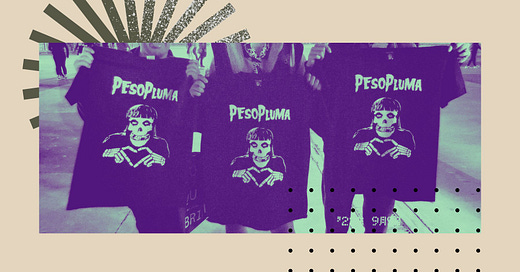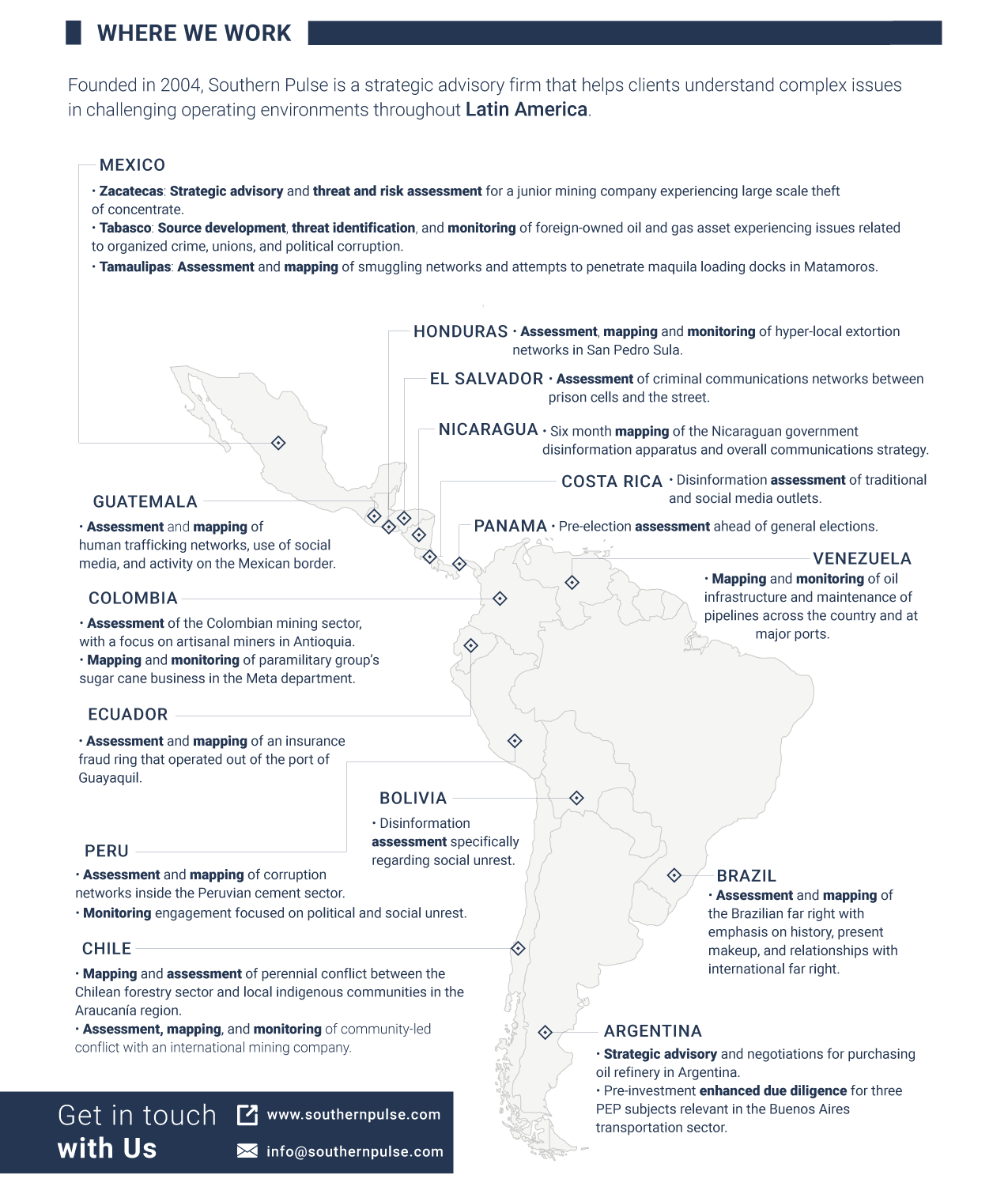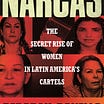“The truck goes by fast. Fast is important for whoever’s driving,” sings Mexican superstar Peso Pluma in the song El Rapido (the fast one).
“Some radios fire off fast. So do the rifles, which have already killed some. Under the orders of Señor Archivaldo.”
The singer, who was Spotify’s fifth most-listened-to artist worldwide in 2023 and whose name I first heard from my 11-year-old son, just canceled his planned appearance at Chile’s Viña del Mar International Song Festival for “personal reasons.”
Peso Pluma’s decision, which also involved calling off several other dates in the region, ended weeks of soul-searching by the festival’s organizers and certain government officials on whether to let him play after controversy erupted when his name was announced on the lineup in January.
Both the country’s soul-searching and the controversy are warranted, and those planning or already doing business in Latin America would do well to understand it.
The business of narcocultura
Popular culture has a huge influence on how people spend their disposable income and varies both nationally and regionally. Understanding its nuances and dynamics is vital to many business concerns, from manufacturing to marketing. “Narcoculture” and artists such as Peso Pluma have embraced many brands whose identities have become synonymous with bling and a flashy lifestyle.
Peso Pluma, 24, is part of a musical movement known as corridos tumbados. The genre combines rapping with traditional Mexican ranchero melodies and narcocorrido-style lyrics that, among other things, tell stories of characters’ escapades in the narco underworld. He and other musicians including Natanael Cano and Grupo Firme are both credited and criticized for glorifying the drug trade, its power, and its spoils.
The lyrics used by the genre are often very specific. The Archivaldo that the singer is referring to in the aforementioned lyrics is likely Iván Archivaldo Guzmán Salazar. He’s one of the four sons of Joaquín “El Chapo” Guzmán, known collectively as Los Chapitos. The brothers are allegedly now in charge of a powerful faction of the Mexico-based Sinaloa Cartel, whose tentacles reach across the region and the world. Iván Archivaldo and two of his brothers remain fugitives on the US Drug Enforcement Administration (DEA)’s most-wanted list, with a bounty of up to $10 million on his head.
Senate President Juan Antonio Coloma promptly attacked Peso Pluma’s inclusion in the prestigious festival, calling it the “normalization of narcoculture in our country.” Others referred to his appearance as casting a spotlight on “la voz del narco” — the voice of drug trafficking.
This controversy highlights clear pitfalls and risks for companies and brands, whether they are targeting high-income individuals or a broader audience. From something as simple as sponsorship deals at music festivals and events to concerns about who is buying and using their brands’ products and services, companies could easily find themselves in the middle of similar situations and should be prepared to walk the tightrope to safety.
Protest, not promotion
Defenders of Peso Pluma and other artists in the same vein argue that the corridos tumbados genre is the product of a generation that has never known anything but the “drug war” — a term used to describe, both in the US and Mexico, a militarized assault on trafficking groups.
Organized crime and its related violence arguably continues to be one of the biggest public security threats in Latin America, affecting Mexico, Colombia, Honduras, and now Ecuador, among other countries. The violence emanates not just from the conflict between government forces and criminal armies, but from the rivalries between those criminal groups and the violence they exert on the population to bow it to their will or recruit it to their ranks.
“It’s one thing to listen to the cultural expression of a youth that grew up in the drug war and another to hear the voices of criminal organizations,” argues Mexican activist Dahlia de la Cerda in the Spanish newspaper El Pais. “I would re-word it. Do we have to listen to young people singing to narcos? And I would say yes.”
Young, brown males are overwhelmingly the victims of violence and arrests in drug-related violence and anti-crime government campaigns. Yet working for the criminal armies that rule swathes of Latin America, despite the dangers, can often seem like a solid job option for young people in a region plagued by poverty, inequality, and unemployment.
“It’s one thing to listen to the cultural expression of a youth that grew up in the drug war and another to hear the voices of criminal organizations.”
Peso Pluma has been portrayed as a “son of the drug war” who questions the establishment. “When he was ten years old, and he was writing his first verses, Joaquín Guzmán Loera appeared at number 701 on Forbes’ 2009 billionaire list. And when he was 16, the news announced that “El Chapo” had escaped a high-security prison for the second time,” writes journalist Oscar Balderas in Mexico newspaper Milenio.
In January, organizers of the Chilean music festival agreed with defenders of the genre, doubling down on Peso Pluma’s performance and stating that it would not “censure or discriminate” against the young artist. After all, Los Tigres Del Norte, another very famous Mexican band known for their narcocorridos, played the festival in 2006 with no fuss. But other voices chimed in with new arguments, some of them compelling. Perhaps the strongest was that there is little that is countercultural about narco culture.
“There is some ultra-liberal corporate culture, some hard machismo, another part that values weapons and violence, a lot of consumer culture and ideological fantasizing about a rise in the social order and the cult of money,” argues sociologist Alberto Mayol.
All of the arguments summarized so far are true and coexist uncomfortably. This isn’t a case of either/or, but rather both. Here, we could heed the words of the late, great writer David Foster Wallace. In 2005 he warned that even though we consciously or unconsciously choose what we worship, what we choose will almost always end up eating us alive.
The hero-worship of traffickers exemplified by the likes of Peso Pluma across Latin America is real. This is the case even in countries like Chile, which was once regarded as the region’s Switzerland. President Gabriel Boric’s government treated the funeral of a prominent drug trafficker and influencer last year as “high risk” as street disturbances associated with these incidents continued to grow. His administration also tried to pass legislation to limit such events, and also keep people from erecting narco monuments and tombs in memory of prominent criminals around the country. It’s not only local criminal organizations that are earning a name for themselves. Venezuela’s Tren de Aragua, which began life as a prison gang, has also reportedly expanded into the South American nation.
In countries such as Mexico, such worship is even more flagrant and deeply embedded in the culture. In the city of Culiacán, Sinaloa, home to the eponymous cartel, visitors can visit a downtown chapel dedicated to unofficial narco patron saint Jesus Malverde and buy a small statue in the image of El Chapo himself. At his feet lies the number 701— his ranking on the Forbes rich list in 2009.
Politicians have also embraced narco spoils
The open condemnation of traffickers by Latin American politicians could be forgiven for provoking a smirk in a region where the corruption of governments, governance, and state institutions is a perennial problem, as well as a necessity for the drug trade to operate. Arguably, politicians on the take from international drug business profits have been equally seduced by the narco life as Peso Pluma’s young fans.
There are myriad contemporary examples of this, perhaps the most timely being the trial of Honduras’ former president Juan Orlando Hernández, currently underway in the US. The former head of state is accused of aiding and abetting drug traffickers — prosecutors allege that he once said he wanted to “shove the drugs right up the noses of the gringos.” His brother Tony is already in prison, serving a life sentence for cocaine trafficking.
Exhibit B is Ecuador, which burst into the headlines at the beginning of the year when young male gang members took over a public news broadcast live on air. Meanwhile, their criminal colleagues caused chaos on the streets after the nation’s worst-offending criminal somehow slipped out of solitary confinement from a high-security prison. He is yet to be found. The reason for the violence ravaging the once-peaceful South American country? Cocaine profits, which have corrupted not only the country’s youth but also its government, justice institutions, and the ports hosting part of the major pipeline used for shipping cocaine to the US and Europe.
In terms of the region’s history, there are too many names to mention — Genaro Garcia Luna, Salvador Cienfuegos Zepeda, Manuel Noriega, and Jesús Gutiérrez Rebollo to name just a few. Here’s a run-down of the region’s top ten corrupt government officials.
The loathing and simultaneous worship of the likes of Peso Pluma show Latin America’s ambiguity towards the world of organized crime, its bling culture, and its spoils. In the region with the highest homicide rates related to drug trafficking and organized crime in the world, it’s hard to deny that some sectors of popular culture adore and glorify what is also killing us. That’s a dynamic that businesses poised to do business in the region ignore at their peril.
Whether it’s Mexico, Chile, or elsewhere in Latin America, Southern Pulse has the experience, network, and relationships to simplify this challenging region with honest, direct answers to your most complicated questions.
Want to learn more? Let’s chat.
CC BY-ND







